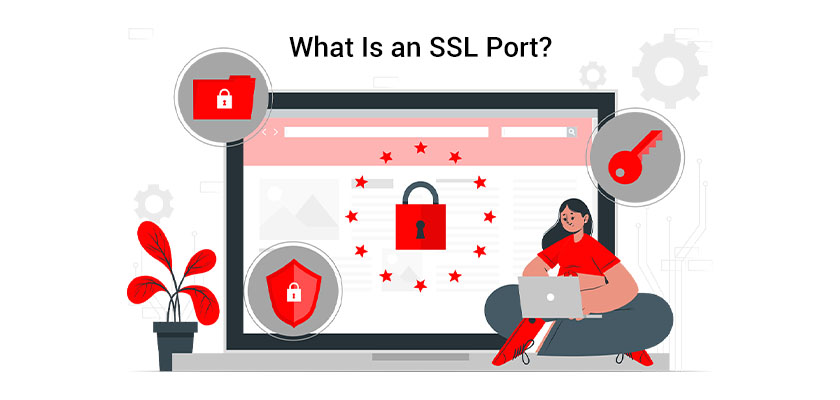
In the case of computer systems and software, there’s constantly communicating on the internet. Making the communication process function requires various components. In the case of phones, there has to be a receiver, a sender, and a signal that connects them. Ports function as both a transmitting as well as a receiving point, and they have particular numbered addresses that allow the system to identify which location the data is transmitted.
They are programmed to redirect traffic to the appropriate locations or in terms of aids to systems that allow the system response to identify the service that is being demanded. They can handle encrypted HTTP internet traffic using ports 80 through 21 FTP which allows the transfer of documents and data between the servers and the clients.
There are 655,535 ports; however, not all ports are being used daily. The TLS/SSL certificate port is among the ports that are most popularly used, and it is certainly utilized on a regular basis. What is an SSL port? The port for TLS/SSL is 443, HTTPS which uses certificates from TLS/SSL to ensure that the connections are secured. HTTP is port 80, which is the protocol port that’s not secure. In this article, we’ll discuss the SSL port list and where to buy an SSL certificate
What Is an SSL Port or Secured Port?
Information exchange between organizations and people electronically, regardless of whether it is private or confidential data. This feature on the internet is a major reason to have the need for the security of data over the web. SSL Port, also known as Secured Port, often referred to in the industry as Secured Port, uses a Secure Sockets Layer (SSL) certificate to secure internet connections.
SSL technology’s principal goal is to ensure that internet connections are safe through encryption and authentication. On websites that we browse, it is an encrypted connection to the server. SSL makes sure that the information sent through the web remains secure and secure by encryption of the data that are transferred from the server to the client. Additionally, the SSL port tells us whether our connection is secure or not.
Differences Between SSL and HTTPS Port
The HTTPS protocol operates on top of the SSL certificate placed on a website server. At the same time, both are used in conjunction with each and serve as two separate elements of creating an encrypted connection.
SSL certificates work by ensuring that the SSL certificate is used to verify the identity of a person when they try to transmit information. This technology, however, is being phased out and replaced with TLS, which performs more effectively than the previous version.
The primary distinction between HTTP and. HTTPS is the fact that only HTTPS is encryption and secure channels through which data can be transmitted securely.
For a way to determine if a site has an SSL certificate, check the URL of the website and see whether it has an HTTPS extension as well as the padlock icon beside the domain’s name.
Most Common HTTPS Ports

Now let’s look at the SSL default port and SSL port list.
Port 443
The Internet Engineering Task Force (IETF) recognizes the TCP port number 443 as the standard HTTPS protocol. It offers an encryption method that allows the exchange of information between web servers as well as browsers. HTTPS port 443 functions by protecting network traffic before data transmission takes place.
It is a dedicated port for internet browsing; it makes use of an SSL/TLS certificate for encryption to convert the text into an algorithm. It then transforms it into ciphertext prior to transmitting it through the servers. This stops unwanted listening and the stealing of data sent through the protocol.
Port 8443
Port 8443 can be described as another HTTPS port, as well as a main protocol used by the Apache Tomcat web server employed to access the SSL text service.
Additionally, the port is used primarily as an HTTPS Client authentication connecting protocol.
The HTTPS port allows encrypted communication through the generation of an authentication key pair for the user to be stored inside the browser. The server is then able to verify the authenticity of the key pair prior to making an encrypted connection.
Why Should You Buy an SSL Certificate?
It may seem like a minor issue, but it’s not, but your SSL port is vital because of a myriad of reasons. To begin, HTTP is falling out of favor. Actually, over 97 % of websites are loaded using HTTPS using Google Chrome within the United States, according to Google’s HTTPS Transparency Report. Apart from the fact that “everyone else is doing it,” there are a number of benefits to the use of HTTPS in comparison to HTTP.
Reduce your vulnerability to criminal activities
HTTPS adds an additional security layer to protect against digital eavesdropping. Criminals track network activity in order for the purpose of stealing valuable data such as login details. Since HTTPS is secure can help stop the kind of crime that is committed.
HTTPS is a requirement to ensure PCI conformance
If you store data from credit cards through your site, you’re obliged by the Payment Card Industry to use HTTPS.
HTTPS can load websites faster than HTTP
In addition, HTTPS provides an experience that is more secure, but it also has the potential to improve the loading times of the content on your website.
SSL will improve your SEO
HTTPS is favored by the major search engines and is thought to be beneficial to SEO. It is vital to use HTTPS properly and follow a couple of additional steps to make sure that you benefit from SEO.
How to Get an SSL Certificate
Suppose you’re interested in getting an SSL certificate for your personal site. In that case, the most effective option is to select a certificate authority, create an application for a certificate signing (CSR) and then send the certificate to the certifying authority.
When your certificate is verified after which, you can place it on your site in order for an encrypted connection for new users.
Read More: Free vs. Paid SSL Certificate: Which is Better?
Conclusion
SSL certificates are just one of the methods to create and maintain an encrypted connection on the internet. With browsers, websites, applications, servers, and nearly every other digital online channel, It is crucial to make the correct options to protect internet users. SSL certificates are a way to ensure the safety of users. SSL certificate gives users and servers the ability to establish and operate with an airtight and secured connection.
Leave a Reply